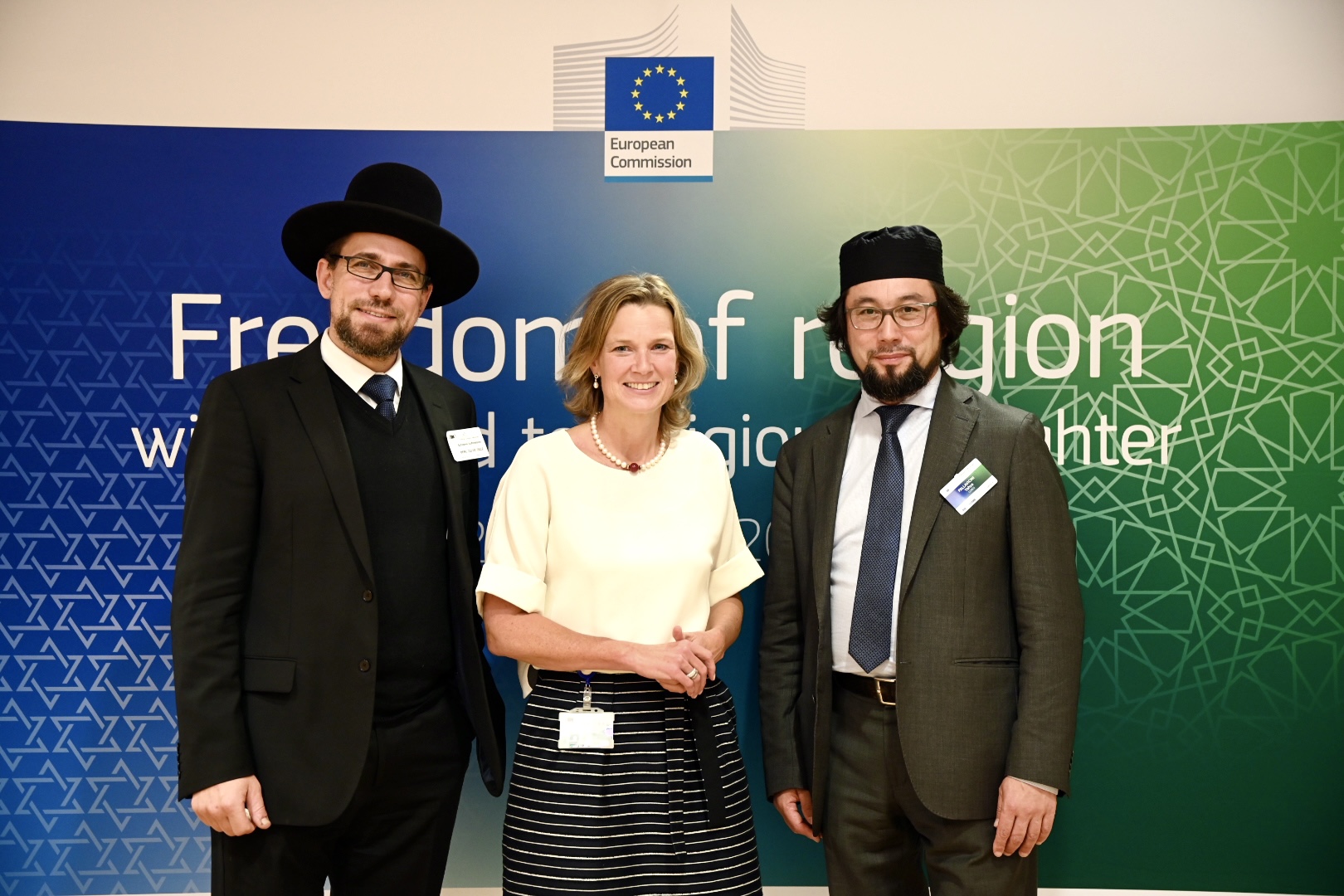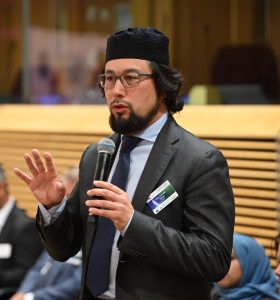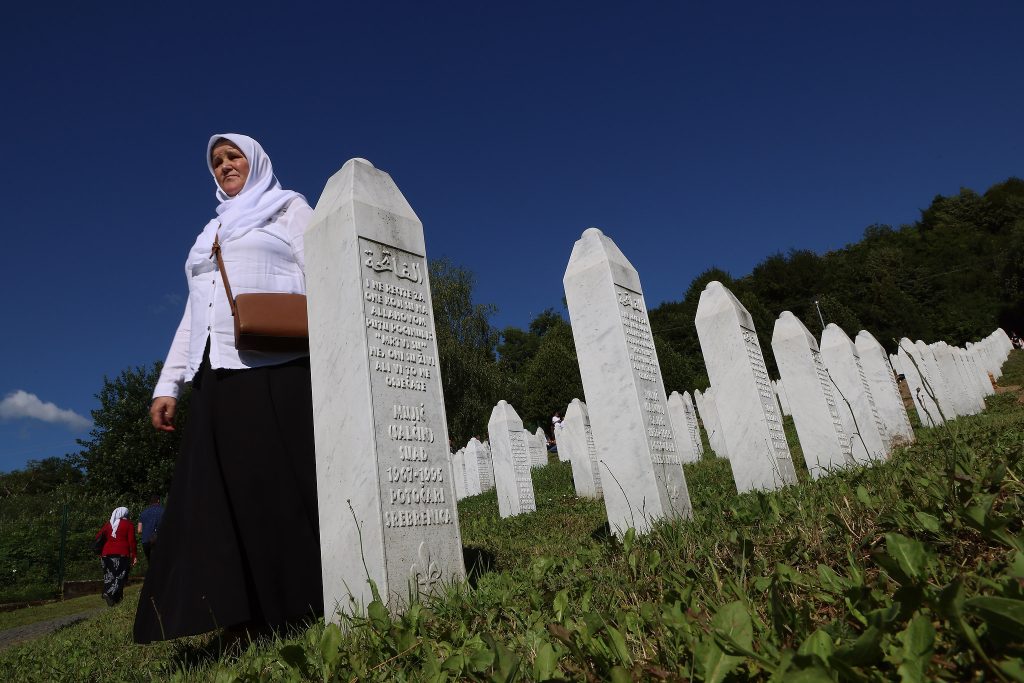Translated from “Rabbiner und Imam: “Leben in einer Zeit des religiösen Analphabetismus”” by Naz Kücüktekin and published in Kurier on 17/12/2022. Read the German version.
Schlomo Hofmeister has been the municipal rabbi of Vienna since 2008. Tarafa Baghajati is the imam and chairman of the “Initiative of Muslim Austrians”. Both serve on the board of the “Muslim Jewish Leadership Council” for interreligious dialogue. The KURIER met the two at the “European Policy Dialogue Forum” organized by KAICIID to discuss the challenges faced by religious communities, spirituality and conflicts.
KURIER: A rabbi and an imam at a table. An image that still seems unusual. Why is that?
Schlomo Hofmeister: Because a lot of jokes start like that… But it’s just unexpected. In principle, these are inter-religious gatherings.
Tarafa Baghajati: Many automatically have conflicts in mind, especially in the Middle East. In addition, we both belong to a minority in Austria. And some think they have to bring us together somehow.
Hofmeister: In our Western society, there is often the assumption that religious people are intolerant and don’t know anything about others and don’t want to know anything.
In other words, outsiders don’t even notice that communication is taking place anyway?
Hofmeister : Not everything that the public talks about actually takes place and not everything that takes place is discussed in public. These are always just the tip of the iceberg. Social media has done even more to make things seem out of proportion.
In what way?
Hofmeister: Everyone can write whatever they want on social media. If he has the right range, that will also be multiplied. That can be blown totally out of proportion. And so the proportions are missing.
Baghajati: In addition, we live in a time of religious illiteracy. People know far too little about their own religion, let alone about the others.
Sometimes one has the feeling that the opposite is the case. For example, when it comes to anti-Semitism in Muslim communities.
Hofmeister: Anti-Semitism is a big problem, also in the Muslim community. Tackling it does not simply mean condemning it, but also proactively raising awareness. This is something that Jewish communities throughout Europe have now come to understand.
Baghajati: And some forces are indeed trying to pit Muslims against Jews. Among other things, in order to distance themselves from anti-Semitism. Then they say: We don’t have a problem with anti-Semitism, that’s your problem, that’s a migrant problem, a Muslim problem. To imply that you have to be afraid of refugees, because they bring anti-Semitism with them. As if there has never been anti-Semitism in Europe. And in that sense, yes, that is its own challenge, to recognize any discrimination and to fight against it.
Mr. Baghajati, you mentioned the Middle East conflict earlier. What role does this play in the communities here?
Baghajati: The most important thing is that we separate between our common life as citizens in Austria and between a conflict that is taking place in another geographical part of the world. Our appeal is that a conflict taking place elsewhere should not cloud our contact in Austria. Moreover, talking to each other on different topics does not mean having to have the same opinion.
What framework conditions must politics provide for a successful interreligious dialogue?
Hofmeister: Historically, religions as representatives of civil society have been given a very high level of recognition in Austria. The exchange among religious societies and the willingness of politicians to accept them are very exemplary. In this respect, we in Austria are certainly above average in Europe.
Baghajati: I can confirm that. But especially in the times of the Austrian People’s Party – Freedom Party of Austria (centre right and right wing) government, with the tightening of the Islam law, we already had the impression that Austria was moving away from its role as a role model.
Hofmeister: I understand the frustration about the Islam law. Some things should have been done differently. But the basic principle of the Islamic law, just like that of the Jewish law, is actually a model.
Baghajati: That’s what we ourselves demanded.
Hofmeister: Many people demand that. Many Muslim communities in Germany don’t get that. Most European countries don’t have anything like that.
The trend in recent years is that the proportion of people who describe themselves as religious is continuing to fall. Is religion losing relevance in Austria?
Hofmeister: Institutionalized religion is certainly something that became less and less important in Europe in the 19th century. In our generation, I see a further drifting away from religion, but also a search for spirituality. And when people don’t find that in their own religion, they look for another religion or other way to live out that spirituality. To summarize: Religion is not disappearing. It is rather a turning away from the institutions, from the establishment.
Baghajati: I also believe that we face great challenges as religious communities. We are in a time when not everyone can afford everything they could afford a few years ago. The religions must radiate ideas of solidarity and social cohesion. It must add some warmth to the social coldness, without necessarily wanting to proselytize.
How do religious communities also have to deal with issues of the day, such as the climate crisis or
identity issues?
Hofmeister: The entire rabbinic literature of the last 2000 years deals with the principles of the Torah, Jewish law and how they are to be applied to changing times. But perhaps religions are sometimes a bit slow and wait to see if an issue will resolve itself. And there are some topics that boil up and then disappear again. It takes time for that to become established in practice, in the rabbinic debate.
Baghajati: Issues such as genetic engineering, environmental protection, dealing with armament and nuclear. Abortion or euthanasia. On all these things, there is a great deal of Islamic literature that also disagrees with each other. This is where scholars are called to provide answers and to be anti-discriminatory. It takes courage from the religious communities to stand up, to be there, in order to have a positive effect on society as a whole.





WASHINGTON, DC – A bill to ban non-medical circumcision in Iceland has predictably provoked outrage from Jews and Muslims. They have every reason to be concerned: There have also been calls to outlaw ritual circumcision in the Netherlands and Scandinavia; doctors in the United Kingdom are under pressure to support a ban as well; and few have forgotten that the practice’s legality was challenged in Germany in 2012.
Circumcision has increasingly come under fire in Europe, because the definition of human rights has expanded to include children’s bodily integrity, while the definition of religious freedom has narrowed to include primarily worship and association. But if this emerging hierarchy of rights isn’t managed carefully, the legitimacy of the entire human-rights project could be imperiled.
According to Silja Dögg Gunnarsdóttir, the Progressive Party parliamentarian who introduced the Icelandic bill, the central issueis “children’s rights, not … freedom of belief.” Gunnarsdóttir accepts that “everyone has the right to believe in what they want,” but she insists that, “the rights of children come above the right to believe.”
For his part, Imam Ahmad Seddeeq of the Islamic Cultural Center of Iceland has countered that circumcision is a part of the Muslim faith, and that Gunnarsdóttir’s bill amounts to “a contravention [of] religious freedom.” And Agnes M. Sigurðardóttir, the Bishop of Iceland, has warned that the ban would effectively turn Judaism and Islam into “criminalized religions,” because anyone practicing circumcision could be subject to six years in jail.
Complicating matters further, both sides base their arguments on human rights. For example, some supporters of the ban have argued that circumcision violates Article 5 of the Universal Declaration of Human Rights (UDHR), which states that, “no one shall be subjected to torture or to cruel, inhuman, or degrading treatment or punishment.” The term “treatment,” supporters argue, applies to circumcision.
At the same time, some of those defending the practice have also pointed to the UDHR, particularly Article 18, which holds that, “everyone has the right to freedom of thought, conscience, and religion.” Moreover, Article 18 defines this right broadly: everyone has the “freedom, either alone or in community with others and in public or private, to manifest his religion or belief in teaching, practice, worship, and observance.” The term “practice” would seem to include circumcision.
Confronting questions of human rights requires that one consider context, in order to balance the rights and obligations of inhabitants of increasingly diverse societies. In the matter of circumcision, there are obvious tensions not just between religious freedom and individuals’ physical integrity, but also between parental rights and the authority of the state, multiculturalism and nationalism, and religious and secular moral perspectives.
Moreover, different communities prioritize human rights differently. For some, the moral framework offered by human rights is sufficient in itself; but for others, as William Galston of the Brookings Institution notes, “the language of human rights hardly exhausts the realm of moral and spiritual goods.”
In other words, culture plays a much larger role in shaping interpretations of human rights than many realize, which implies that human-rights practitioners should be wary of passing judgment on any practice with deep cultural or religious roots. As the cultural psychologist Richard Shweder notes, circumcision has featured in conflicts between Europeans and Middle Easterners for centuries. The Jewish revolt against Greek rule in the second century BCE, which Jews now commemorate annually as Hanukkah, was caused in part by a decree banning circumcision under penalty of death.
In Western countries, meanwhile, interpretations of human rights have evolved alongside a larger cultural shift toward individualism and secularism, prompting opposition to a broad set of religious practices. The circumcision issue is one gauge for measuring whether Western societies still value religious freedom enough to accommodate and appreciate a diversity of beliefs and practices. Circumcision has been an integral part of the cultural identity and religious faith of a large portion of the world for thousands of years. The current movement to abolish it in the West augurs a further narrowing of the scope of religious freedom.
The danger in this is that cherry-picking certain rights to enforce secular norms will not just undermine the overall project of human rights, which aims to unite the world’s peoples and improve lives through a shared understanding of the minimum conditions necessary to advance the “inherent dignity” and equality of “all members of the human family.” It will also undercut the credibility of the liberal order, which was founded on tolerance for diversity and minority groups.
Banning circumcision would represent a marked shift away from that tradition in the West. As the United States has historically shown, tolerance means upholding a broader definition of people’s right to practice religion, or otherwise express their cultural identity, according to their beliefs, while withholding judgment on whether such beliefs are “right” or “wrong.”